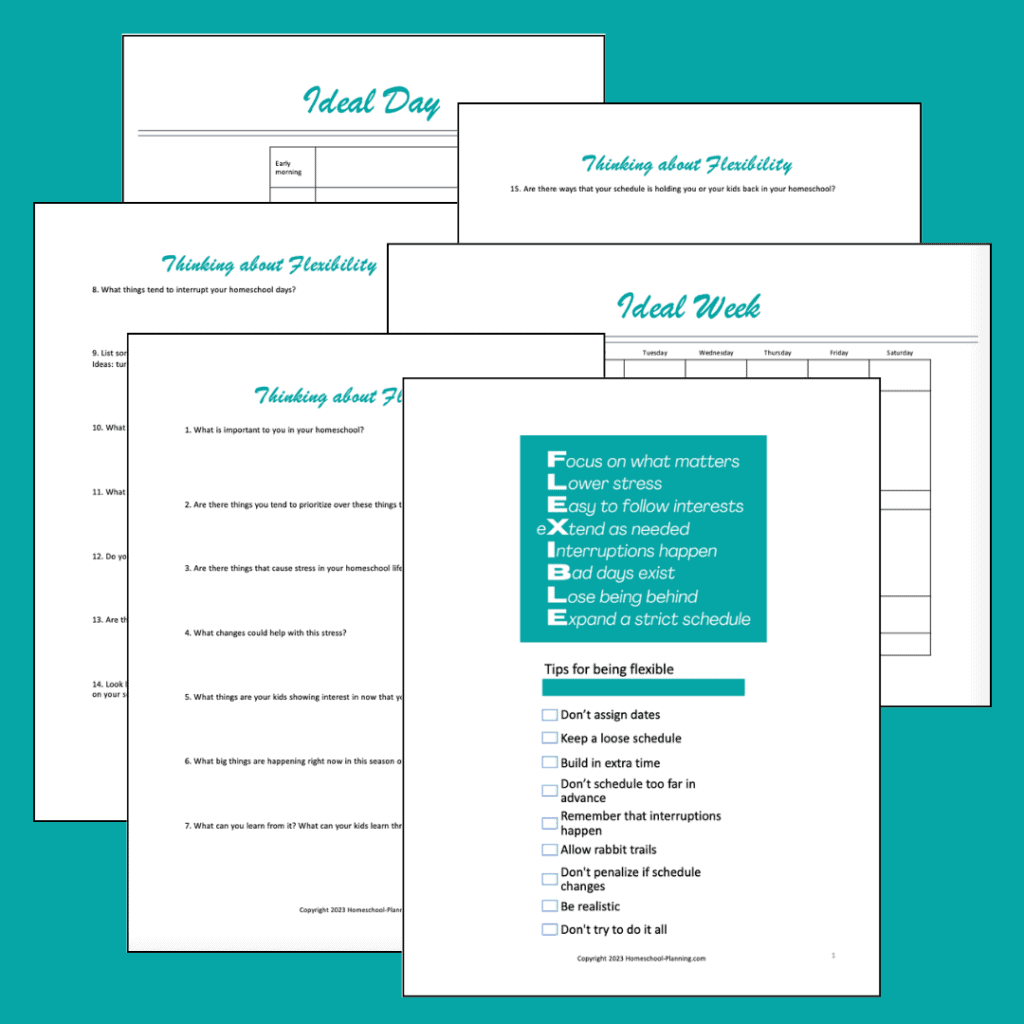Homeschooling allows you to structure your days and schedules however you like. But kids are kids and challenges come up. That’s why in this blog post, we’re going to talk about what we consider to be the most vital tool in your homeschool schedule – flexibility.
So, if you’re a homeschooling mom who wants to include more flexibility in your homeschooling journey, keep reading to find out why flexibility is essential and how to make it a priority in your schedule.

Most important tool for your homeschool
In homeschooling, flexibility is important. While we have the freedom to design our schedules and curriculum, we’re often faced with unexpected challenges.
Being flexible allows us to adapt to changing circumstances, adjust plans, and make room for the unexpected. That’s why flexibility is the most vital tool in any homeschool schedule.
Don’t worry, this isn’t just a rant about flexibility. Keep reading and I’ll give you practical tips on how to include flexibility into your homeschool schedule.
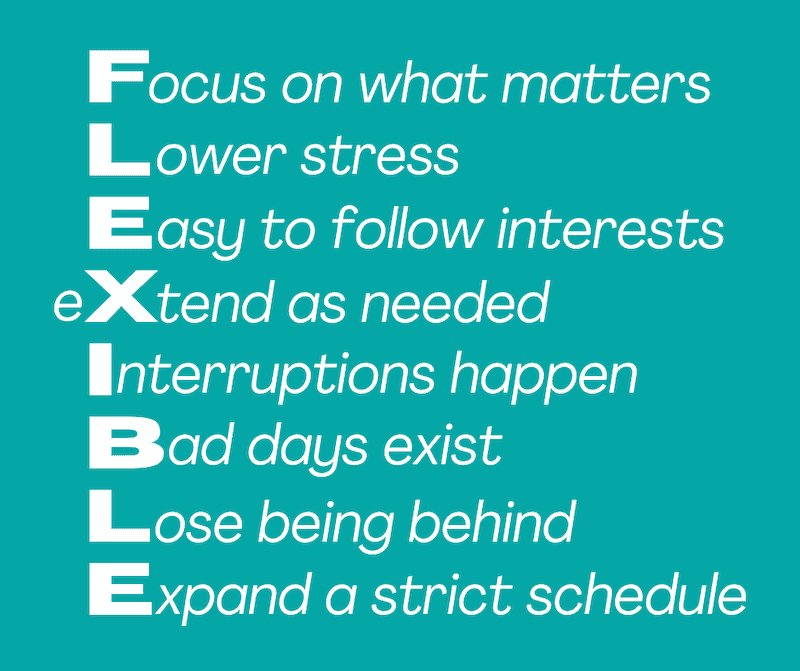
Vital tool: being FLEXIBLE
Using flexibility as a tool for your homeschool schedule can help you in many ways. It can help you focus on what matters in your homeschool and lower stress in your life. It can make it easy to follow your children’s interests without feeling trapped by time, extending your schedule as needed.
Let’s face it – interruptions happen in our lives and bad days exist. It’s just impossible to always be on top of everything and never feel behind. But flexibility will allow you to lose that feeling.
Even if you thrive on a tight schedule, building in some time and flexibility will help your homeschool be more successful.
Dictionary.com says flexibility is “the quality of being easily adapted” or “the ability and willingness to adjust one’s thinking or behavior.” With these definitions in mind, we can see the clash between heavy structure and plans with flexibility.
So let’s talk more about how flexibility can help.
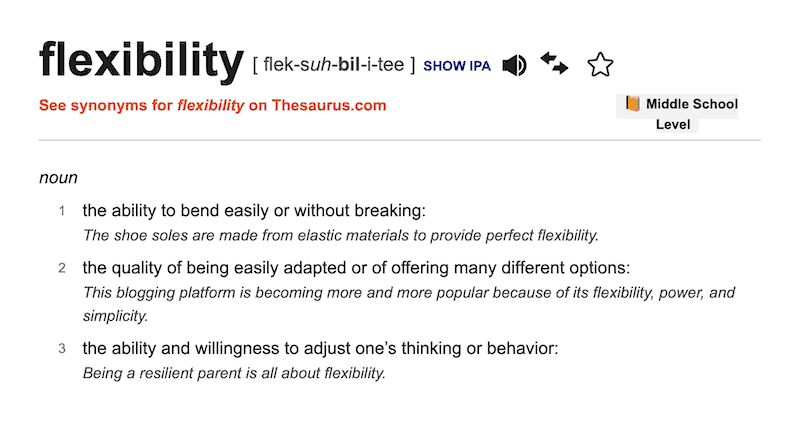
You can Focus on what matters
If you feature flexibility as a tool for your homeschool schedule, you will be able to focus more on what matters. When struggles arise or when interests are piqued, you can focus on those things. You are encouraging learning, not checking boxes.
When your child struggles in their math lesson, you can take an extra 10 minutes to help them work through the struggle and gain confidence. Or when your child is really enjoying learning about Egyptian hieroglyphs, you can give them some more time to practice them.
This is a struggle of mine sometimes. Finding the balance between continuing to learn new things, working through the curriculum, and also following the interest.
If following all the rabbit trails makes your Type A list brain twitch out, it’s ok to say no sometimes. Or to limit the rabbit trails.
But some should be followed. Find ways to come back to the topic later. Let your child read more on their own. Encourage the love of learning in your kids by giving them time and resources to pursue their interests.
When checking off boxes and charts becomes priority over learning, things can get dicey. Or when staying on your schedule is more important than enjoying a new topic, is that really the best way to encourage learning?

It helps Lower stress
Allowing flexibility into your homeschool schedule helps lower stress. Stress can be lowered by including some unplanned margin into your schedule and accepting movement and changes to your schedule rather than fighting them.
When you allow yourself some margin in your days and weeks, it can help you and your kids feel less pressure to complete everything perfectly as planned. This will allow any “bleed over” from difficult or emotional days some room. As we know these things can’t be planned and controlled.
In a similar way, you can allow a little exploration of topics and some small deviations from your plans. This will help encourage some interest in learning, helping your children enjoy school more. This may add a bit more work on your part, but if you’re expecting it, or work some extra time into your plans to allow for it, it won’t be stressful or difficult.
Many will argue that a strict schedule helps reduce stress for them due to the routine and ability to know what happens next. There’s no questions or wondering about what to do. This is likely true for some.
Remember though, that your kids may not agree or function as well within a tight schedule. And emotions and life happens even to those with tight schedules. So allowing a little extra built-in breathing room and flexibility with your plans will help when those unexpected things are thrown your way.

Makes it Easy to follow interests
Being flexible with your homeschool plans and schedule allows you to follow interests throughout the year. When you have space and freedom to loosen the reigns and follow those rabbit trails.
I’m not sure about you, but there are times when I first hear about something and I want to learn all about it. Get all the books, watch the movies, talk about it. But often I don’t make the time.
The interest doesn’t leave completely, but the drive to find the information does. The passion and interest dissipate over time. Is the passion necessary to learn? Of course not, but it sure makes it easier to learn.
It’s a fabulous thing to have the time in your plans to let that passion drive you deeper. Learn about things together and pursue the rabbit trails.
I’m not saying you scrap all the plans and only follow your passions. Not at all. I am saying it’s good occasionally to loosen the structure of your days and allow some time for unstructured pursuits.
“For the mind does not require filling like a bottle, but rather, like wood, it only requires kindling to create in it an impulse to think independently and an ardent desire for the truth.”
-Plutarch
You can eXtend time as needed
I see it often that the homeschool plans and time restraints are so important that moms will dig in their heels when things need to change. I get it. I often feel the weight of it all too.
The pull of getting things accomplished, checking the boxes, finishing all the things. You don’t feel you can venture from what you have planned.
But what if I told you that you can do it anyways? Build in the flexibility. Create margin. Allow time. Make your plans so they’re easy to manipulate. Do it from the beginning.
Don’t switch subjects because the timer goes off. Keep reading a book if you want. Build in free time.
If you want to, do it. You have the control over your plans and schedule. You can extend the time as needed to follow interests or take a field trip. Or finish the writing project.
While children’s attention spans are short, let’s try to help them learn to focus well for good amounts of time. Encourage them to push their boundaries, not shorten them.
We don’t have to turn on a dime like the corporate world. We’re not public school teachers. Allow the time needed to do what you and your children need. If that need changes, all the plans can change as well. Extend the time in your schedule.

Because Interruptions happen
I’m sure you know those days. You wake up, and your kids are grumpy, the baby had a blowout, and you burn breakfast. Then once you recover from all that, your husband texts about changing an appointment. Then your mom calls to check on you and next thing you know you’ve used your whole morning and no one has done any school.
You could throw the towel in surrender and start over tomorrow or you could turn on a documentary for your kids. Neither of which is what you have planned for that day of school.
Of course you could also suck it up and force everyone to do their schoolwork through tears and meltdowns (mostly yours).
How do you deal with this?
I suggest you give yourself some grace and allow the plans to not rule you. Flexibility is key.
Sarah MacKenzie from Read Aloud Revival talks about this. She has said how we sometimes think about our babies as interruptions from our lessons, but maybe the baby is the lesson. Our kids will learn about taking care of other people and small children. About love. Those big important life lessons are not interruptions.
Life happens. We don’t have to live life by a time clock or be ruled by a bell. Life is messy and full of interruptions. So add in flexibility to your homeschool. It will all go better this way.
Bad days exist
Sometimes you wake up on the wrong side of the bed. Or all your children do. It’s inevitable that some days will not go well or as you planned.
As women, we don’t always have the superhero powers to do all the things. So allow yourself to have some flexibility and plan for bad days. Allow margin in your calendar. Let your plans be pushed aside once in a while. Sanity is more important than the plans.
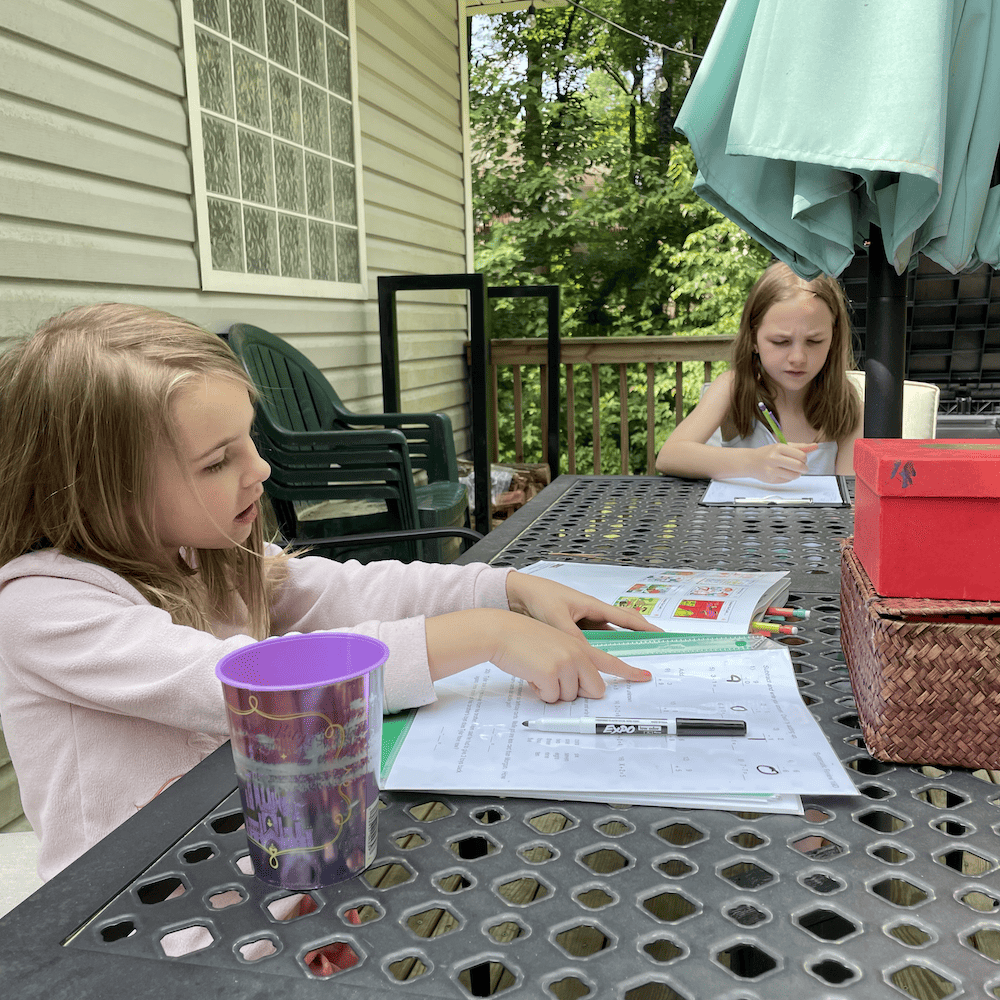
You will Lose being behind
There’s a constant debate in the homeschooling world about finishing curriculum. We make our plans, have our curriculum, then life happens and we get behind in those plans.
Some people require the plans to be finished. While others say there is no being behind in homeschool.
I struggle with this every year. Truly. I am a planner and like to make plans and stick to them. But life happens and kids are kids. Over the years I have had to learn to hold my plans lightly and to allow change and flexibility.
If you hold your plans lightly, there is no “being behind” in homeschooling. It’s just not possible. When you build in room for your plans to breathe, they can expand into that space as the year moves on.
This allows so much freedom and helps you to focus on what matters in your homeschool. You don’t need to be trying to teach your kids all the things. Try to help them learn and not lose the love of learning along the way.
Changing plans helps to keep your perspective centered in the right place. You will never actually be behind again.
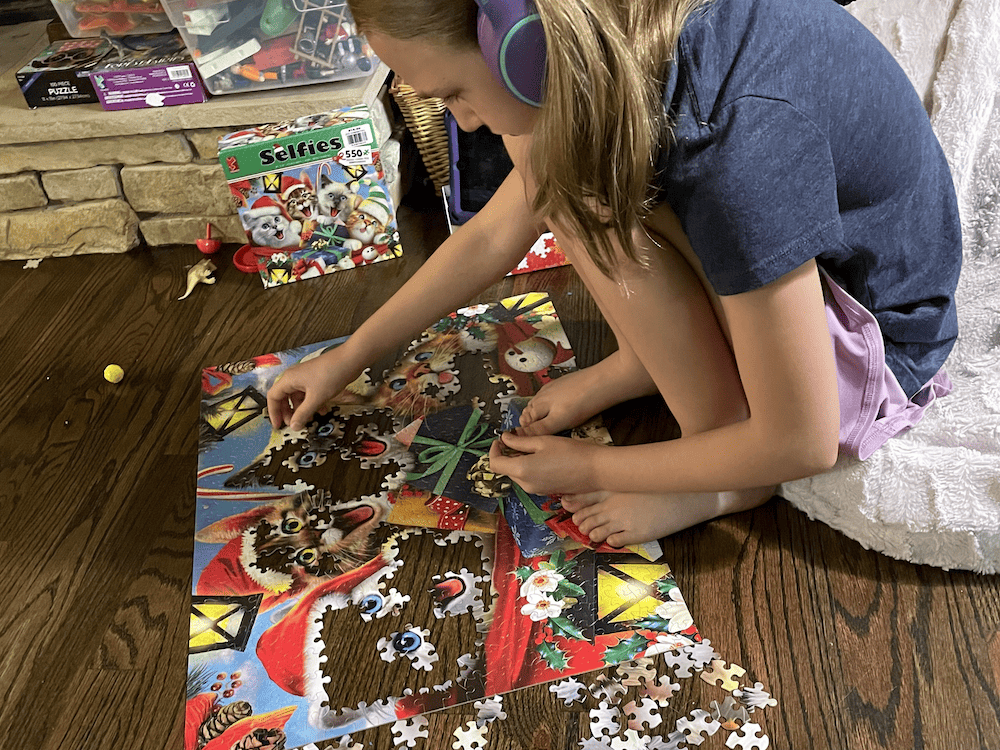
Helps you Expand a strict schedule
What do you do if math takes more than the allotted 20 minutes? If you move the rest to the next day, then what do you do that day? Do you finish that lesson and the next? And what if that one takes too long? Then your whole plan for math is off. ahhhh! This can happen with any schedule or subject.
An alternative could be to do one math lesson for however long it takes. Or you really could just move forward each math assignment and “mess up your plans” if you need it to take 2 days. I hear the panic attack coming. I promise it’ll be ok, don’t worry.
So what happens if you don’t have such a strict schedule? Allow some extra time for things to run over. Or allow one day each week for catching up.
As homeschoolers, we are only on our own time frame. There is no rule that you have to complete an entire book in one year. Or do everything according to the schedule in the book.
Really you don’t!
Sometimes we can create stressful boxes for ourselves that we’re constantly trying to fit into. And squeeze our children into.
So maybe you need to get a bigger box with some wiggle room. Or maybe you should ditch the box altogether.
Stop trying to treat your homeschool like a public school. Stop trying to make it a corporate work environment.
Structure is good, routine is amazing. Keep those things. But add in some flexibility to the schedule so no one is smothered.
For another metaphor, just expand the seams of the garment and add in some breathing room. Don’t put yourself in a corset when a camisole works just fine.

Note: flexibility, not laziness
When I talk about flexibility, I don’t mean laziness. If your day is so flexible that you often find yourself skipping school work altogether, you need more structure – not less.
If you have thrown out your routines completely and just go with the flow, I’d argue that you’ve gone too far. Kids (and adults!) need routines and structure in their lives. It helps them feel safe and allows them to trust.
I am not in any way suggesting extreme flexibility, which could definitely easily become laziness. As with anything, things can be taken too far.
So make your plans, get a schedule, develop a routine. But make sure it’s flexible. Allow it to breathe with you. But don’t get lazy and fall asleep on the job.

How do I have flexibility?
After reading all this so far, I hope you’re getting the point. Yes, flexibility is great. So now you’ve got to be asking, “how can I be more flexible?” Here are my quick tips for adding flexibility to your homeschool schedule:
- Don’t assign dates
- Keep a loose schedule – general time blocks
- Build in extra time
- Don’t schedule too far in advance
- Remember that interruptions happen
- Allow rabbit trails
- Don’t penalize if schedule changes
- Be realistic
- Don’t try to do it all
To go deeper on these practical tips, check out my other post on flexibility about How to Have a Flexible Homeschool Schedule. In this post, I go into detail about each one of the above tips. So check it out!
Read: How to have a flexible homeschool schedule
Free Printable Flexibility Worksheets
With all this information, you now have the tools you need to apply more flexibility to your own homeschool. Make it happen today with these free flexibility worksheets!
Filled with tips, guided questions, and even schedule templates, you can think through your entire schedule today.
Write out your goals, find stress points, and discover ways to address them. Then actually design a new weekly and daily schedule to apply!
Download your free set of printable worksheets today!

Most vital tool for your homeschool schedule
I believe flexibility is the most vital tool for your homeschool schedule. By being adaptable and open to change, you can get through unexpected challenges and make the most of your homeschooling journey. With a flexible mindset, you can embrace the ups and overcome the downs, and create a successful and fulfilling homeschool for both you and your child.
So, take a breath and embrace the power of flexibility in your homeschooling journey. Then watch your kid’s education flourish.
I’d love to hear how being more flexible has helped your homeschool. Let me know in the comments below!
Related Posts
7 Hacks for your Homeschool Schedule









